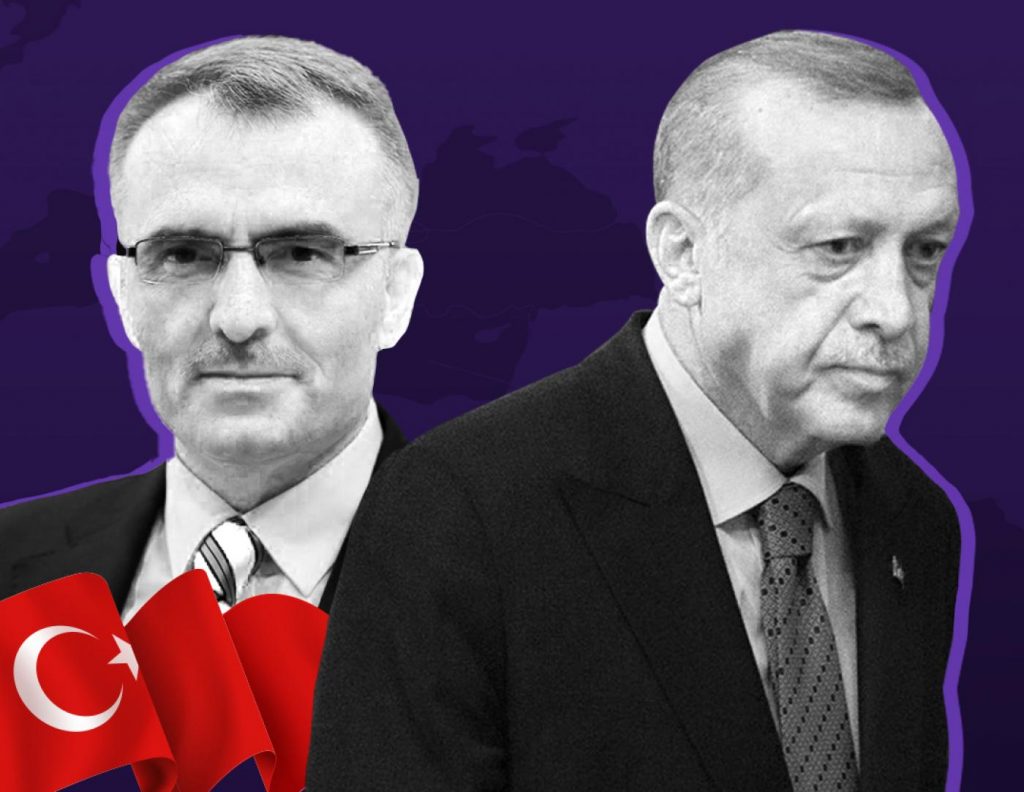Even some of the most ardent supporters of Turkish President Recep Tayyip Erdogan were truly shocked and angered last week by his decision to sack Naci Agbal, the central bank governor, less than five months after his appointment.
Turkish officials, technocrats, academics and others who have supported Erdogan in his ups and downs over the years this time couldn’t find any logical reason to fire Agbal, whose initial ascension to the job last November increased confidence in markets, stopped soaring US dollar exchange rates and led to more than $15bn inflows into the country.
“This was a very sad day. No one could reasonably explain why he did it so suddenly,” a Turkish official told Middle East Eye, speaking on condition of anonymity. “Why did you appoint him in the first place just months ago if you were going to fire him?”
When Erdogan appointed Agbal as the new central bank governor, the markets perceived it as a pragmatic move to stop the lira’s freefall and restore order and confidence into the Turkish economy with an orthodox monetary policy.
His sudden firing depreciated the lira by around 10 percent versus the dollar, moved the country risk premiums to the highest points ever, and evaporated the profits made this year on the Istanbul Stock Exchange.
However, for those who are close to Erdogan, the firing wasn’t really a surprise. “Erdogan’s relationship with Agbal had been steadily deteriorating,” said one Turkish official close to the president. “Their communication wasn’t good at all.”
Officials and sources close to the presidency say Erdogan was truly astonished by Agbal’s interest rate hikes. “Publicly and privately, Erdogan repeatedly told Agbal what he thinks of interest rate hikes. And Agbal seemed to have understood what the president wants,” the official close to the president added.
Hiking rates
Erdogan is famous for his ideological stance against high interest rates. Islam forbids it, but he also believes that high interest rates lead to high inflation, a controversial and heterodox theory that has roots in his ideological upbringing during the Islamist Welfare Party years.
When Erdogan appointed Agbal, who was previously his former budget director at the presidency, he also fell out with his son-in-law Berat Albayrak, who resigned as economy minister after the president discovered that the central bank’s forex reserves were in tatters.
Erdogan named respected politician Lutfi Elvan as Albayrak’s replacement, and started to talk about a “bitter pill” that the government needs to swallow.
“When Erdogan talked about the bitter pill, he meant officially moving the interest rates to the unofficial market rate,” a source close to the Turkish presidency said. “Agbal’s first 475 points increase was approved by Erdogan.”
Agbal’s predecessor Murat Uysal used backdoor methods to hike the rates while officially holding the main policy interest rate much lower.
When Agbal made his first rate hike in November, the official rate was increased to 15 percent, which was a limited tightening since the weighted average cost of funding had already risen to 14.36 percent.
But Agbal didn’t stop there. In December, he increased the interest rates 200 points more, moving it to 17 percent due to soaring inflation. “Erdogan didn’t know anything about it. He saw it on TV,” claimed the source close to the presidency.
A ruling AK Party insider said that a furious Erdogan telephoned Elvan, the economy minister, and told him that he was going to fire Agbal. “Elvan asked for more time to put the house in order. He convinced the president that Agbal would come to his senses,” the source alleged.
As months passed by, the Turkish opposition increased its criticism of Albayrak’s financial policies. The CHP, the main opposition, has been running campaigns, blaming Erdogan’s son-in-law for burning through the central bank’s more than $128bn reserves through public banks to hold the USD/lira rate steady since 2019.
“Where is this $128bn?” asked the CHP’s leaders in an official petition that asked for a parliamentary inquiry in December.
As public pressure has built up, Erdogan felt a need to defend his former economy minister in February. “Albayrak has signatures on everything from the discovery of gas resources in Black Sea to mining in this country,” Erdogan said in a public address. “Berat has taken many steps of reforms in the finance sector. [CHP] officials are a bunch of conmen.”
The president also expected a statement of support from Agbal, who never gave it, further undermining his relationship with Erdogan, multiple sources said.
The final blow for the president came as Agbal hiked the interest rates by 200 points last week, well above the market expectation, giving Turkey the seventh-highest interest rate in the world.
The move was seen as a further step to restore the credibility of the central bank, as inflation was once again soaring. “The case for a hike was compelling. Inflation has risen 165bps [base points] since the last rate hike on December 24,” Tim Ash, a London-based investor, said at the time.
“Against that backdrop, inflationary expectations are rising again, and there is not much sign of a reversal in dollarisation which is key to the central bank replenishing forex reserves which are at mission critical low levels.”
Several reports point out that Turkey has around $190bn in short-term loans, mostly in the private sector, to be refinanced in the next 12 months, while the central bank’s net reserves stand at around minus $47bn.
However, according to the people close to him, Erdogan perceived the hike as a direct challenge to his authority. “He could tolerate a small hike. But this was like a middle finger,” the source close to the presidency said.
Rest of the article is here.
Ragip Soylu / Middle East Eye
